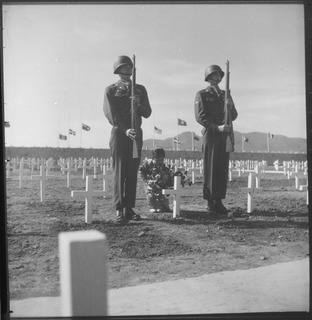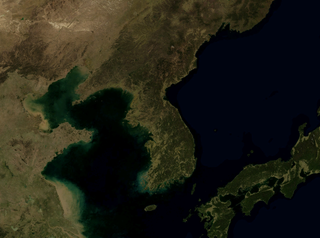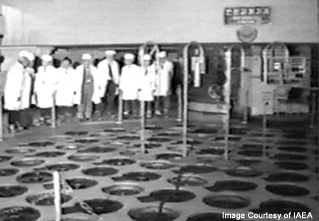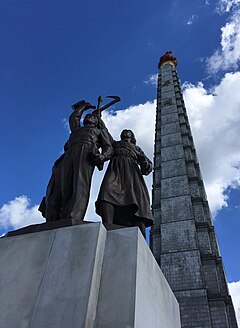
The United Nations Security Council (UNSC) is one of the six principal organs of the United Nations (UN), charged with ensuring international peace and security, accepting new members to the United Nations and approving any changes to its charter. Its powers include the establishment of peacekeeping operations and international sanctions as well as the authorization of military actions through resolutions – it is the only body of the United Nations with the authority to issue binding resolutions to member states. The council held its first session on 17 January 1946.
A United Nations General Assembly Resolution is voted on by all member states of the United Nations in the General Assembly.

The United Nations Command (UNC) is the unified command structure for the multinational military forces, established in 1950, supporting South Korea during and after the Korean War.

United Nations Security Council resolution 825, adopted on 11 May 1993, called upon the Democratic People's Republic of Korea to reconsider its decision to withdraw from the Nuclear Non-Proliferation Treaty and allow weapons inspectors from the International Atomic Energy Agency (IAEA) into the country, after it had previously refused entry.

United Nations Security Council Resolution 1695, adopted unanimously on July 15, 2006, after recalling resolutions 825 (1993) and 1540 (2004) concerning North Korea and the non-proliferation of weapons of mass destruction respectively, the Council banned the selling of material that would further the ability of the Democratic People's Republic of Korea to bolster its ballistic missiles programme.

United Nations Security Council Resolution 1718 was adopted unanimously by the United Nations Security Council on October 14, 2006. The resolution, passed under Chapter VII, Article 41, of the UN Charter, imposes a series of economic and commercial sanctions on the Democratic People's Republic of Korea in the aftermath of that nation's claimed nuclear test of October 9, 2006.

United Nations Security Council Resolution 85, adopted on July 31, 1950, was the United Nations Security Council resolution which authorised the United Nations Command under General Douglas MacArthur to support the Korean civilian population, and requested that specialized agencies, appropriate subsidiary bodies of the UN and appropriate non-governmental organizations support the UN Command in doing so. It was adopted at the 479th meeting after United Nations Security Council Resolution 84 was passed creating the unified command under General MacArthur.

United Nations Security Council Resolution 82 was a measure adopted by the United Nations Security Council (UNSC) on June 25, 1950. The resolution demanded North Korea immediately end its invasion of South Korea, the catalyst for the beginning of the Korean War. The measure was adopted by a vote of 9 support, none opposed, and one abstention.

United Nations Security Council Resolution 83, adopted on June 27, 1950, determined that the attack on the Republic of Korea by forces from North Korea constituted a breach of the peace. The Council called for an immediate cessation of hostilities and for the authorities in North Korea to withdraw their armed forces to the 38th parallel. They also noted the report by the United Nations Commission on Korea that stated North Korea's failure to comply with Security Council Resolution 82 and that urgent military measures were required to restore international peace and security.

The United Nations Security Council Resolution 84 was adopted on July 7, 1950. Having determined that the invasion of South Korea by forces from North Korea constituted a breach of the peace, the Council recommended that the members of the United Nations furnish such assistance to the South Korean state as may be necessary to repel the attack and restore peace and security to the area. The Council further recommended that all members providing military forces and other assistance to The Republic make these forces and assistance available to a unified command under the United States of America. The Council then requested that the United States designate the commander of such forces and authorized said commander to use the flag of the United Nations at his discretion in the course of operations against North Korean forces. Finally, The Council requested that the United States provide it with reports as appropriate on the course of action taken by the unified command.

United Nations Security Council resolution 702, adopted without a vote on 8 August 1991, after examining separately the applications of the Democratic People's Republic of Korea and the Republic of Korea for membership in the United Nations, the Council recommended to the General Assembly that North Korea and South Korea be admitted.

United Nations Security Council Resolution 1715, adopted by acclamation at a closed meeting on October 9, 2006, having considered the question of the recommendation for the appointment of the eighth Secretary-General of the United Nations, the Council recommended to the General Assembly that Mr. Ban Ki-moon of South Korea be appointed for a term of office from January 1, 2007, to December 31, 2011.

United Nations Security Council Resolution 1928, adopted unanimously on June 7, 2010, after recalling resolutions 825 (1993), 1540 (2004), 1695 (2006), 1718 (2006), 1874 (2009) and 1887 (2009) on the topics of North Korea and nuclear weapons, the Council extended the mandate of a panel of experts monitoring sanctions against the country until June 12, 2011.

United Nations Security Council Resolution 1985, adopted unanimously on June 10, 2011, after recalling resolutions 825 (1993), 1540 (2004), 1695 (2006), 1718 (2006), 1874 (2009), 1887 (2009), 1928 (2010) on the topics of North Korea and nuclear weapons, the Council extended the mandate of an expert panel monitoring sanctions against the country until June 12, 2012.

United Nations Security Council Resolution 1987, adopted by acclamation at a closed meeting on June 17, 2011, having considered the question of the recommendation for the appointment of the Secretary-General of the United Nations, the Council recommended to the General Assembly that Mr. Ban Ki-moon be appointed for a second term of office from January 1, 2012, to December 31, 2016.

United Nations Security Council Resolution 2050 was unanimously adopted on 12 June 2012. It extends the UN's mandate to monitor nuclear, chemical and biological weapons possessed by North Korea, extending the mandate of the Panel of Experts.

United Nations Security Council Resolution 2087, adopted unanimously on January 22, 2013, after recalling all previous relevant resolutions on the situation concerning North Korea, including resolutions 825 (1993), 1540 (2004), 1695 (2006), 1718 (2006), and 1874 (2009), the Council condemned the December 12, 2012 rocket launch by the Democratic People's Republic of Korea. North Korea cited this resolution as the cause of the 2013 Korean crisis.

United Nations Security Council Resolution 2094, adopted unanimously on March 7, 2013, after recalling all previous relevant resolutions on the situation concerning North Korea, including resolutions 825 (1993), 1540 (2004), 1695 (2006), 1718 (2006), 1874 (2009), and 2087 (2013), the Council condemned the Democratic People's Republic of Korea's third nuclear test. Furthermore, it increased the power of other nations to enforce these sanctions.

The Republic of Korea and the Democratic People's Republic of Korea were simultaneously admitted to the United Nations (UN) in 1991. On 8 August 1991, the UN Security Council passed United Nations Security Council Resolution 702, recommending both states to the UN General Assembly for membership. On 17 September 1991, the General Assembly admitted both countries under Resolution 46/1.



















